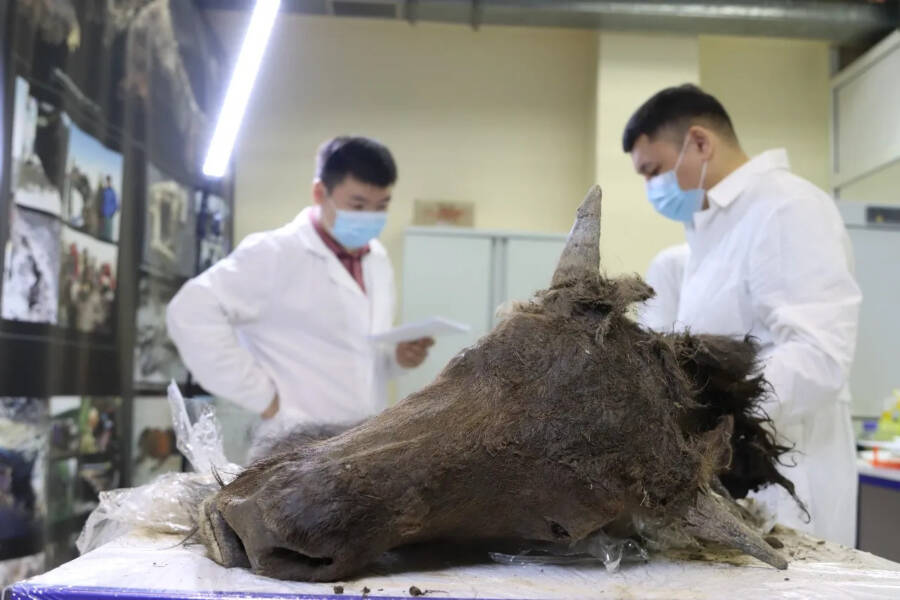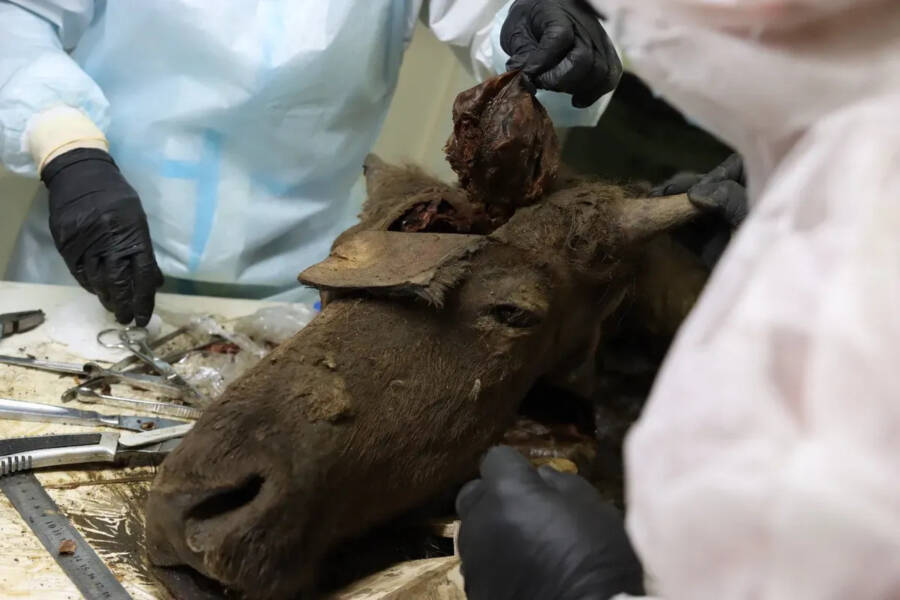The extraordinarily well-preserved bison likely died around 8,000 years ago — and experts hope they can use its DNA to revive the extinct species.

Svetlana Pavlova/NEFU Press ServiceScientists in Russia examine the ancient bison.
In the summer of 2022, the remains of an extinct species of bison were unearthed in the Khaastaakh district of Russia’s Verkhoyansk region. The creature was so impeccably preserved in the Siberian permafrost that some scientists believe they will be able to clone it.
The bison was sent to the Mammoth Museum Library at North-Eastern Federal University (NEFU) in Yakutsk, where researchers performed a necropsy, or an animal autopsy, to find out more about it.
While the scientists did not have the complete remains of the bison — only its head, forelimbs, and part of its chest — they were able to conduct tests to determine its age.
“Preliminarily, this is a young individual, 1.5-2 years old,” Maxim Cheprasov, the head of the NEFU Mammoth Museum, explained in a statement. Experts believe the creature died around 8,000 years ago.
During the necropsy of the bison, experts extracted various tissues for different kinds of testing. The team is hoping to partner with Korean scientists to conduct additional cell research. With the results of the study, researchers will be able to better understand aspects of the ancient bison’s lifestyle such as its habits and diet.
According to the Kenneth S. Norris Center for Natural History, the bison would have lived during a difficult time for large animals.
The end of the Pleistocene epoch, which lasted from about 2,580,000 to 11,700 years ago, saw large megafauna abruptly die out, causing a food chain collapse. Many massive mammals like mammoths and mastodons went extinct during this time.
The late Pleistocene also saw massive climate change. The ancient bison that lived through these times needed to adapt to the dangerous, dynamic environment in order to survive.
The discovery of this preserved bison in Siberia may offer more clues as to how the species lived through these conditions.

Svetlana Pavlova/NEFU Press ServiceThe well-preserved bison still had its brain, which scientists removed for testing.
While scientists are interested in understanding more about the bison’s lifestyle, they are also considering other uses for the remains. Given how well the frozen ground preserved the bison’s tissues, some researchers are confident that they could use DNA technology to clone the animal.
“We are working with a unique find that could be cloned in the future thanks to selected materials,” said Hwang Woo Sok, a NEFU professor and the director of the UAE Biotechnology Research Foundation, according to Interesting Engineering.
Cloning is a difficult process even with live animals, so attempting to clone an animal that has been frozen for thousands of years poses a unique challenge to the research team.
“To make cloning possible, one needs to find intact chromosomes, but what we see even in the best specimens is that each chromosome is fragmented into millions of pieces,” paleogeneticist Love Dalén, who is not involved with the research, told Live Science. “In my view, it is more likely that you can flip a coin and get heads a thousand times in a row than it is to find an intact chromosome from a specimen that is thousands of years old.”
Only time will tell if researchers can pull off the seemingly impossible. For now, they are simply rejoicing at coming one step closer to understanding this planet’s natural history.
After reading about how researchers hope to clone an ancient bison, discover 36 extinct animals that many people wanted to clone. Then, uncover haunting images from America’s mass extermination of bison.





